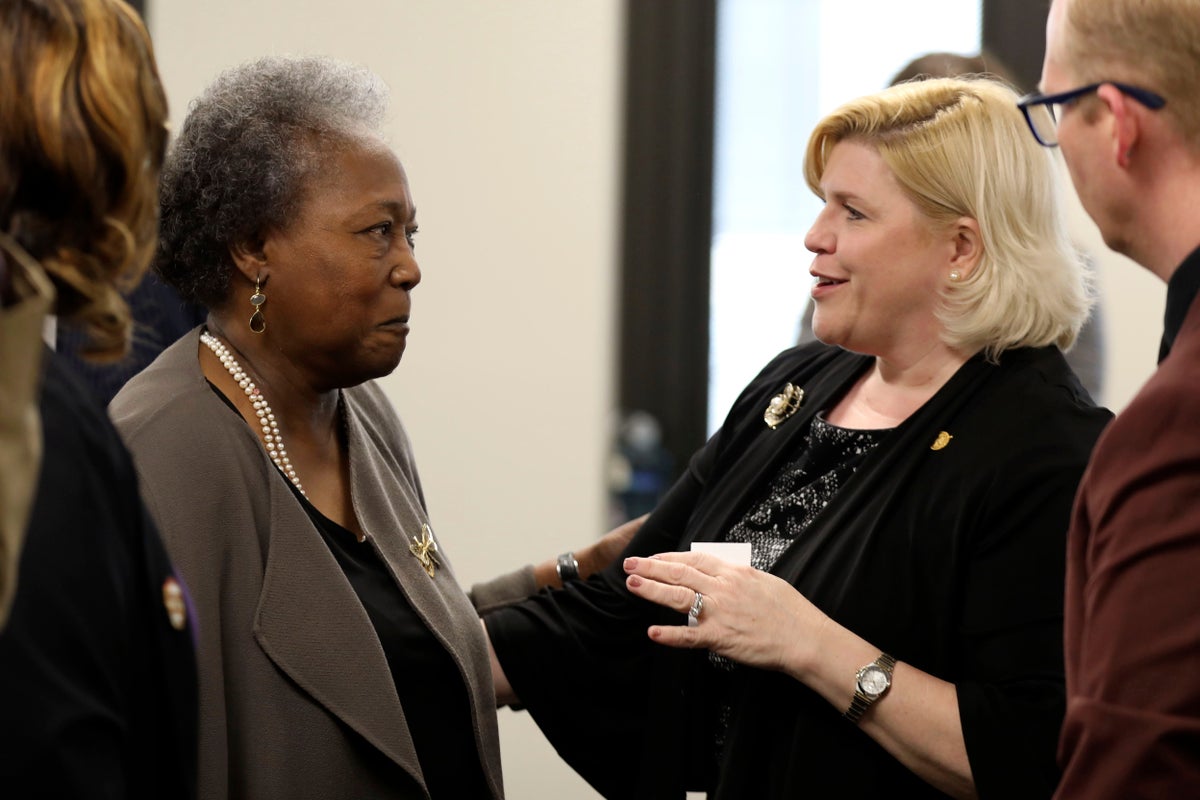
Two survivors of a 2015 racist massacre that killed nine of their friends at a Charleston church told a group of state senators Tuesday that South Carolina's lack of a hate crimes law is an insult to what they suffered through at their Bible study.
The survivors said it sends a message that the state isn't serious about stopping the kind of wickedness that led to the massacre.
South Carolina and Wyoming remain the only U.S. states without a law giving stiffer penalties for crimes motivated by someone's race, sexual orientation, religion or disability.
Polly Sheppard briefly recounted how every one of the Black worshipers killed in Bible study at Emanuel AME were shot multiple times by a white gunman, who told Sheppard he was only leaving her alive so she could tell people he killed them because he hated the color of their skin.
“If we had a better law, it wouldn’t allow these people to do the things they do,” Sheppard said.
Supporters of a hate crime law have fought unsuccessfully for years to pass the bill in South Carolina, and the number of other states without the legal enhancement of bias-based crimes steadily dropped.
The 2023 bill is in a familiar spot. Once again, it passed the typically more conservative South Carolina House. The Senate subcommittee passed it Tuesday, and later in the day, it will go before the full Senate Judiciary Committee, possibly for a vote to send it to the Senate floor.
That's where it died last year. Republican leaders refused to allow it up for a debate or vote, giving little explanation for their opposition beyond saying it be used against conservative Christian groups or that a crime is a crime, no matter the motivation of the criminal.
Senators are considering the House-approved bill which allows a judge to sentence offenders to up to an additional five years in prison if they are indicted and convicted on a state charge that their violent crime was motivated by hate toward the victim’s race, religion, sex, gender, sexual orientation, national origin or physical or mental disability.
They also are considering a version filed in the Senate that is similar, but includes a definition of sex and a statement that nothing in the bill should violate freedom of speech.
Sheppard was joined Tuesday by Felicia Sanders, who shielded her 5-year-old granddaughter from the shooting and played dead while her son was shot and killed in front of her.
“This is the charge that God has put on my life,” Sanders said.
Neither Sheppard nor Sanders had testified in person about the bill this session or before. Before they spoke, the meeting was unfolding as others had recently — a police chief, alliances against hatred of Jewish people, gay people and people of color all had asked senators to pass the bill.
Those in favor of the bill cited an increase in reported hate crimes, as well as the business community saying corporations might think twice about locating or expanding in a state without hate crimes protections. They also mentioned online forums where hate groups note South Carolina's lack of a law as a place that might be accepting of them. They didn't speak long since their arguments have been made before.
Then came the two survivors.
"South Carolina is a great state, so we should act like we are a great state," Sheppard said. “Please consider the hate crimes bill. Please pass it."
The bill is named in honor of Sen. Clementa Pinckney, the pastor at Emanuel AME who was gunned down as he prayed. The shooter was convicted of federal hate crimes and sentenced to death.
Sheppard's other appearance in favor of the bill was in a video Democrats showed in the state Senate last year, reminding them of their fallen colleague whose desk was draped in black before they voted to remove the Confederate flag from the capitol's front lawn.
“Eight members of the South Carolina Senate are giving a safe haven to hate," Sheppard said in 2022 of the Republicans blocking the bill. “Every time you look at senator Pinckney’s photograph, you should be reminded that hate killed him.”
Democratic Sen. Brad Hutto thanked the survivors for coming Tuesday.
“It is so important we not forget. You being here is extremely important,” Hutto said.
Two Democrats and two Republicans voted the bill out of subcommittee. Republican Sen. Billy Garrett was the sole vote against. He did not comment and did not look up from the papers in front of him as Sheppard and Sanders spoke.
Republican Sen. Penry Gustafson, who voted for the bill, spoke to Sheppard after the hearing and asked her for a photo.
“Sincere condolences from the state, from the Senate, and we will be considering this bill,” she said.







